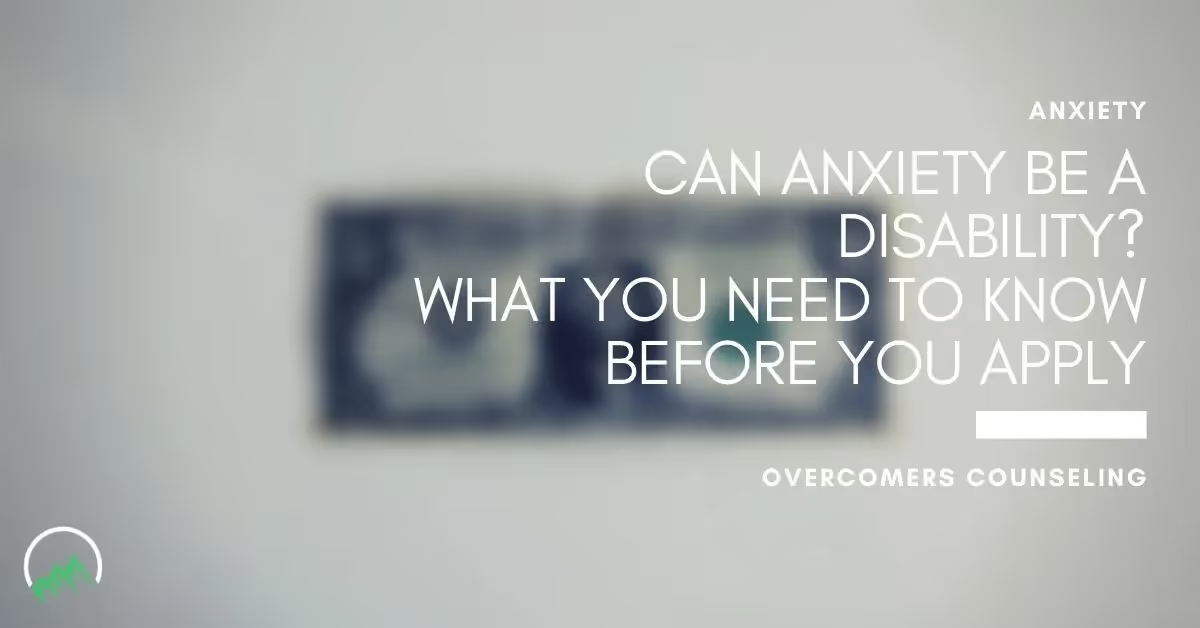The short answer is yes, Anxiety can be a disability. Anxiety can escalate to a level where one is unable to leave home and function in the...

The short answer is yes, Anxiety can be a disability. Anxiety can escalate to a level where one is unable to leave home and function in the community. Anxiety can make it impossible to maintain employment, drive a car, and interact with others. Anxiety can take away from one's ability to perform the expected daily tasks of an adult. Suffering from an anxiety disorder is a miserable experience.
But anxiety is highly treatable.
Going on disability if often unnecessary given the available treatment options. I have watched people degrade and devolve after accepting disability. It is not something to be taken lightly. Nothing is gained if the cure is worse than the disorder. Disability life can mean sleeping until noon because there is nowhere you have to be. It can mean skipping showers, as you will be staying home alone. It can mean increased isolation. Ask yourself what you will do all day? What will you do with the rest of your life? This is a very depressing outlook.
The question is, do you really need it?
1. SSI (Supplemental Security Income
2. SSDI (Social Security Disability Insurance)
Before applying, there are some things to consider:
Anxiety is a serious psychological disorder, that can be disabling in its worst forms. But it is also treatable. Accepting disability can make life worse.
Laurence, K.B. (2020). Disability Secrets. NOLO. Retrieved April 11, 2020 from https://www.disabilitysecrets.com/how-much-in-ssd.html
National Alliance for the Mentally Ill. (2020). Social Security Disability Insurance Benefits & Supplemental Security Income. Retrieved April 11, 2020 from https://www.nami.org/Find-Support/Living-with-a-Mental-Health-Condition/Social-Security-Disability-Insurance-Benefits-Su
Social Security. (2020). SSI Federal Payment Amounts for 2020. Retrieved April 11, 2020 from https://www.ssa.gov/oact/cola/SSI.html
Jofee-Walt, C. (n.a.) Unfit for Work: The startling rise of disability in America Retrieved April 11, 2020 from https://apps.npr.org/unfit-for-work/
It's important that you feel comfortable discussing personal matters with your therapist in order to open up and get more out of therapy sessions; therefore finding someone who meets certain criteria like experience level, expertise areas, and personality is key when selecting a therapist who can give meaningful feedback about how best handle issues related to anxiety or other mental health concerns.
Other activities which have been found helpful in reducing both immediate feelings of anxiousness and long-term anxieties associated with chronic disorders include yoga, journaling, nature walks, art therapy, volunteering, and other low-stress activities. Additionally, developing a healthy lifestyle incorporating adequate sleep, physical activity, and nutritious meals can help reduce overall stress levels.
Ignoring anxiety can exacerbate symptoms and make it more challenging to manage over time. This can result in a negative impact on your personal, professional, and social life, leading to feelings of isolation and even depression.
The duration of anxiety counseling varies for each individual, depending on the severity of their anxiety and their progress in therapy. Our therapists will regularly assess your progress and adjust your treatment plan as needed.
To reduce your anxiety, you can practice relaxation techniques such as deep breathing, progressive muscle relaxation, guided imagery, and mindfulness practices. Additionally, regular exercise has been found to be beneficial in managing stress and improving mental health.
Addressing anxiety is crucial because it can significantly impact your quality of life and overall well-being. Left untreated, anxiety can lead to more severe mental health issues, relationship problems, and difficulty functioning in daily life.